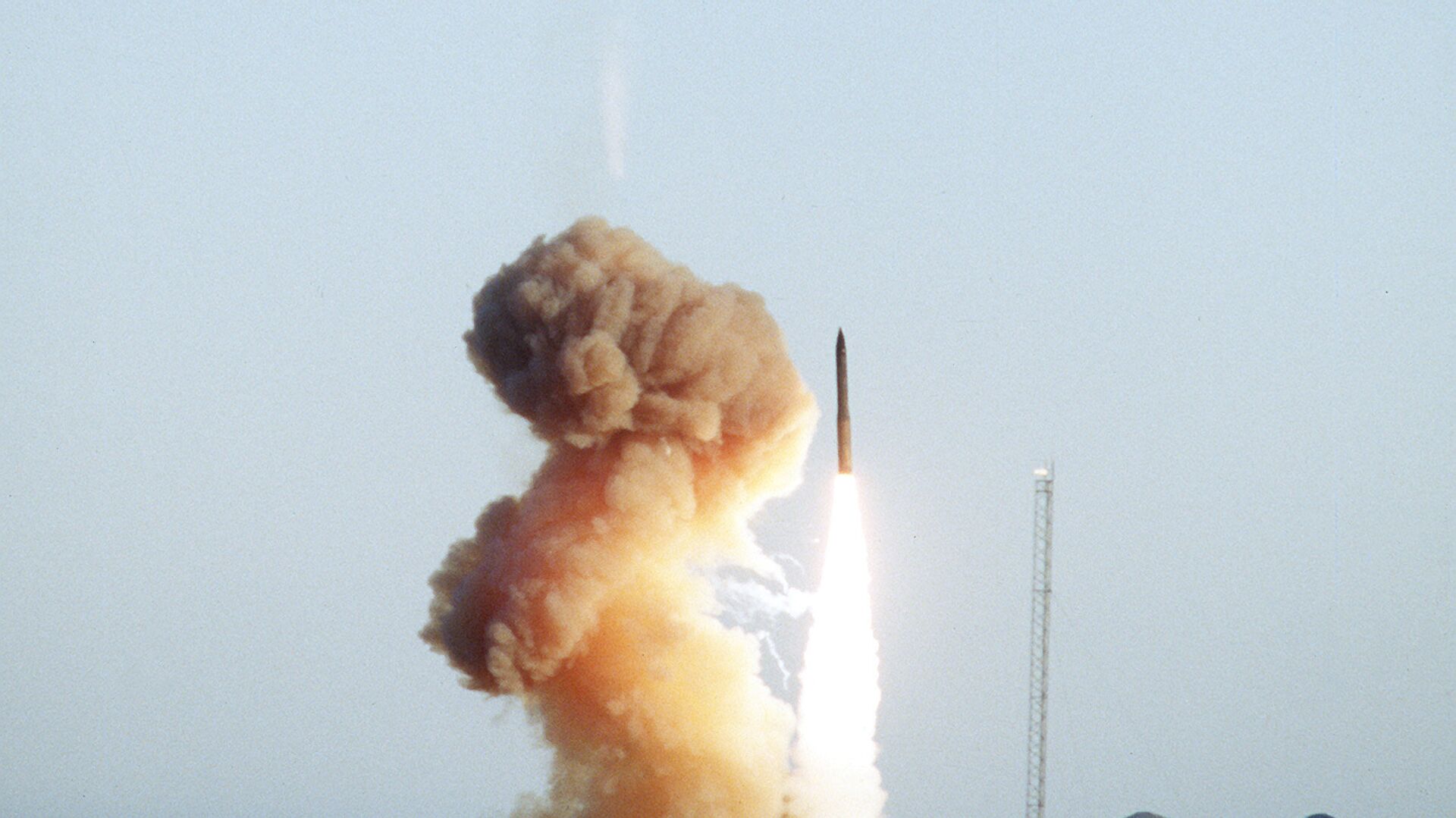https://sputnikglobe.com/20220302/us-test-launch-of-minuteman-iii-ballistic-missile-delayed-pentagon-says-1093532399.html
US Test Launch of Minuteman III Ballistic Missile Postponed, Pentagon Says
US Test Launch of Minuteman III Ballistic Missile Postponed, Pentagon Says
Sputnik International
The aging LGM-30G Minuteman III intercontinental ballistic missile (ICBM) forms the backbone of the land-based US nuclear triad. Introduced in 1970, they are... 02.03.2022, Sputnik International
2022-03-02T20:14+0000
2022-03-02T20:14+0000
2022-08-06T13:28+0000
icbm
minuteman iii
test
russia's special operation in ukraine
postponement
nuclear posture
us
https://cdn1.img.sputnikglobe.com/img/18048/95/180489599_0:1022:1910:2096_1920x0_80_0_0_a075f316843ec76f9f574fc725457e41.jpg
A scheduled test launch of a Minuteman III has been postponed, the Pentagon announced on Wednesday.The launch was scheduled for this coming weekend, but will not be performed due to high tensions with the Russian Federation, where nuclear forces have been placed on high alert.The Pentagon conducts several test-launches of the long-range weapons each year, firing them from silos in the continental United States toward a testing ground in Kwajalein Atoll, in the South Pacific. The missiles are typically armed with a single thermonuclear warhead each, but the test-launches are performed without warheads.The Minuteman III has been in service since 1970 and is presently the only land-based US ballistic missile. The Ground-Based Strategic Deterrent is expected to begin replacing them by 2030, but recent cost-savings schemes have attempted to keep the Minuteman in service until 2050. However, Adm. Charles Richard, the head of US Strategic Command, said last year that such a goal was practically unattainable, the missiles are already so old.On Sunday, Putin ordered Russian nuclear forces put on high alert status, following comments by UK Foreign Secretary Liz Truss that if Russia's military operation in Ukraine were not stopped, it would lead to conflict with NATO.In response, the US and NATO both indicated they saw no reason to increase their own nuclear alert status. Three NATO allies - the US, UK and France - possess nuclear weapons, and several European NATO members have special agreements with Washington to be armed with American nuclear bombs in the case of conflict.The Russian special operation in Ukraine began on February 24 and aims to "neutralize" the country amid fears it could serve as a platform from which NATO could attack Russia. The operation also aims to eliminate neo-Nazi forces responsible for driving the eight-year-long war against ethnic Russians in the Donbass region, where last month Putin extended diplomatic recognition to two republics that broke away from Kiev in 2014.
Sputnik International
feedback@sputniknews.com
+74956456601
MIA „Rossiya Segodnya“
2022
Sputnik International
feedback@sputniknews.com
+74956456601
MIA „Rossiya Segodnya“
News
en_EN
Sputnik International
feedback@sputniknews.com
+74956456601
MIA „Rossiya Segodnya“
Sputnik International
feedback@sputniknews.com
+74956456601
MIA „Rossiya Segodnya“
icbm, minuteman iii, test, postponement, nuclear posture, us
icbm, minuteman iii, test, postponement, nuclear posture, us
US Test Launch of Minuteman III Ballistic Missile Postponed, Pentagon Says
20:14 GMT 02.03.2022 (Updated: 13:28 GMT 06.08.2022) The aging LGM-30G Minuteman III intercontinental ballistic missile (ICBM) forms the backbone of the land-based US nuclear triad. Introduced in 1970, they are expected to last until 2050. However, leaders at US Strategic Command have cast doubts on that goal.
A scheduled test launch of a Minuteman III has been postponed, the Pentagon announced on Wednesday.
"Last weekend, Putin directed special alert of Russian nuclear forces. We saw this as dangerous and irresponsible. Such provocative rhetoric is unacceptable. The US has not taken any similar steps. In an effort to demonstrate that we have no intention to engage in actions that could be misunderstood, our Minutemen III test launch will be postponed from this weekend," Pentagon spokesperson John Kirby told reporters.
The launch was scheduled for this coming weekend, but will not be performed due to high tensions with the Russian Federation, where nuclear forces have been placed on high alert.
The Pentagon
conducts several test-launches of the long-range weapons each year, firing them from silos in the continental United States toward a testing ground in Kwajalein Atoll, in the South Pacific. The missiles are typically armed with a single thermonuclear warhead each, but the test-launches are performed without warheads.
The Minuteman III has been in service since 1970 and is presently the only land-based US ballistic missile. The Ground-Based Strategic Deterrent is
expected to begin replacing them by 2030, but recent cost-savings schemes have attempted to keep the Minuteman in service until 2050. However, Adm. Charles Richard, the head of US Strategic Command,
said last year that such a goal was practically unattainable, the missiles are already so old.
Kirby said the decision to postpone the launch does not affect the US' nuclear posture or deterrence. He added it was "'it was not tied to a specific action or inaction" by Russian President Vladimir Putin, but said the US would like to see Moscow reciprocate on nuclear posture.
On Sunday, Putin ordered Russian nuclear forces
put on high alert status, following comments by UK Foreign Secretary Liz Truss that if Russia's military operation in Ukraine were not stopped, it would lead to conflict with NATO.
In response, the US and
NATO both indicated they saw no reason to increase their own nuclear alert status. Three NATO allies - the US, UK and France - possess nuclear weapons, and several European NATO members have special agreements with Washington to be armed with American nuclear bombs in the case of conflict.
The Russian special operation in Ukraine began on February 24 and aims to "neutralize" the country amid fears it could serve as a platform from which NATO could attack Russia. The operation also aims to eliminate neo-Nazi forces responsible for driving the eight-year-long war against ethnic Russians in the Donbass region, where last month Putin extended diplomatic recognition to two republics that broke away from Kiev in 2014.


